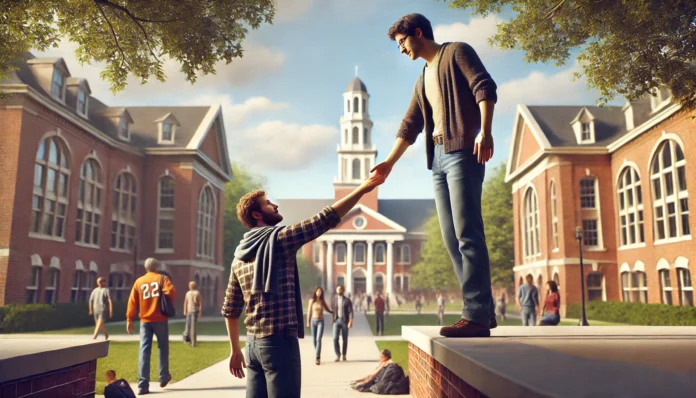The Emergence of Atheist and Humanist Chaplains
Atheist and Humanist chaplains are redefining spiritual care in the 21st century, forging a new path for those who seek meaning, comfort, and ethical guidance outside traditional religious frameworks. As highlighted in the recent CNN article, these chaplains are increasingly present in hospitals, universities, and other institutions, reflecting the growing number of Americans who identify as religiously unaffiliated—the so-called “nones.”
Meeting the Needs of a Changing Society
With nearly 30% of Americans now identifying as nonreligious, the demand for secular spiritual care has never been higher. Atheist and Humanist chaplains provide support for people who do not find resonance in traditional religious services but still seek community, ethical reflection, and comfort during life’s most challenging moments.
Jason Callahan, a Humanist chaplain at Virginia Commonwealth University Health, emphasizes that his role is to offer compassionate presence and support, not to proselytize. “People need someone to talk to about meaning, loss, and hope—regardless of their beliefs,” Callahan notes. His work in hospitals demonstrates that spiritual care is not the exclusive domain of the religious, but a universal human need.
Voices Leading the Movement
Greg Epstein, the Humanist chaplain at Harvard University and MIT, has long advocated for the inclusion of nonreligious perspectives in spiritual care. Epstein, author of Good Without God, argues that secular chaplains help foster a sense of belonging and ethical community for those who do not believe in a deity. His leadership has inspired a new generation of chaplains who serve the needs of atheists, agnostics, and the spiritually curious.
Vanessa Gomez-Brake, Associate Dean of Religious & Spiritual Life at the University of Southern California, highlights the importance of representation. “Students want to see themselves reflected in the people who support them,” she says. Gomez-Brake’s work ensures that secular students have access to chaplains who understand their worldview and can provide relevant guidance.
Michael Skaggs, director of communications for the Chaplaincy Innovation Lab, points out that the rise of Atheist and Humanist chaplains is part of a broader trend toward inclusive, pluralistic spiritual care. Skaggs notes that chaplaincy is evolving to meet the needs of a diverse society, where spiritual care is about presence, empathy, and ethical support—not religious dogma.
Impact in Hospitals, Universities, and Beyond
In hospitals, Atheist chaplains like Callahan provide comfort to patients and families who may feel alienated by religious language or assumptions. Their presence ensures that everyone, regardless of belief, can access compassionate care during times of crisis.
On university campuses, Humanist chaplains like Epstein and Gomez-Brake create spaces for nonreligious students to explore meaning, build community, and engage in ethical reflection. These chaplains help students navigate the challenges of young adulthood without the pressure to conform to religious norms.
Beyond institutions, the work of Atheist and Humanist chaplains signals a broader cultural shift. As more Americans identify as “nones,” the need for secular spiritual care will only grow. This movement affirms that meaning, morality, and community are not the exclusive property of religion, but are accessible to all.
Addressing Criticism with Facts and Logic
Some critics question the legitimacy of Atheist chaplains, arguing that chaplaincy is inherently religious. However, this view ignores the reality that spiritual care is about supporting people in their search for meaning, not enforcing belief. Studies show that nonreligious individuals experience the same existential questions and emotional needs as their religious peers. Denying them access to chaplaincy services is both illogical and exclusionary.
Furthermore, the presence of Atheist and Humanist chaplains does not diminish religious chaplaincy; rather, it enriches the field by making it more inclusive and responsive to the needs of a diverse population. As Skaggs notes, “Chaplaincy is about meeting people where they are.” In a pluralistic society, that means recognizing and respecting the full spectrum of beliefs—including nonbelief.
Significance for Atheism, Secularism, and the ‘Nones’
The rise of Atheist and Humanist chaplains is a milestone for the secular movement. It demonstrates that Atheism is not just a rejection of religion, but a positive, life-affirming worldview that values compassion, reason, and community. As more institutions embrace secular chaplaincy, the stigma surrounding nonbelief continues to erode, paving the way for greater acceptance and understanding.
For the growing number of “nones,” Atheist chaplains offer validation and support, affirming that their search for meaning is legitimate and worthy of respect. In a world that is rapidly changing, these chaplains are helping to build a more inclusive, compassionate, and rational society.
Read the original source at CNN: Atheist chaplains are forging a new path in a changing world.

